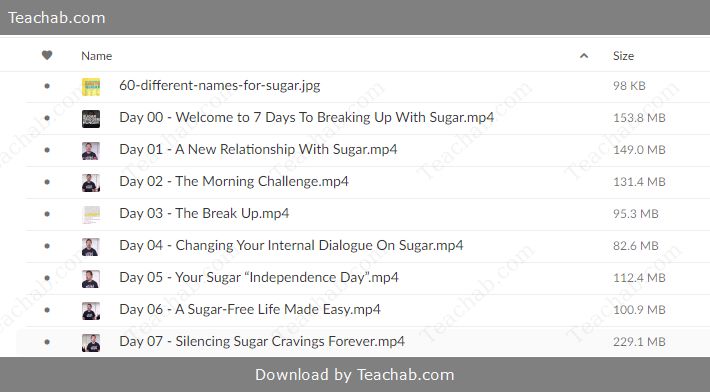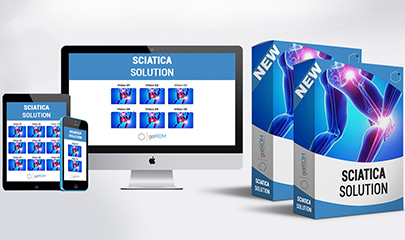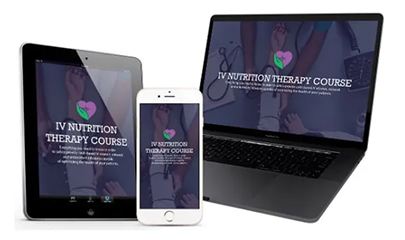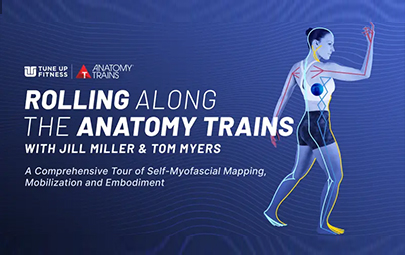7 Days to Breaking Up with Sugar by Eric Edmeades
$5,00
7 Days to Breaking Up with Sugar by Eric Edmeades – Immediate Download!
Let’s embark on a captivating adventure to uncover remarkable insights that spark your curiosity and elevate your understanding

7 Days to Breaking Up with Sugar by Eric Edmeades
Overview

7 Days to Breaking Up with Sugar by Eric Edmeades
Introduction
In today’s health-conscious world, the plea to eliminate sugar from our diets resonates deeply. Eric Edmeades, a renowned speaker and entrepreneur, offers a transformative approach through his program, “7 Days to Breaking Up with Sugar.” This program focuses on addressing and modifying the cravings associated with sugar consumption using behavioral psychology and practical strategies. By illuminating the underlying mechanisms of sugar addiction, Edmeades aims to empower participants to reclaim control over their health and wellness.
Through a well-structured curriculum that spans just seven days, participants embark on a journey toward a healthier relationship with food. With each passing day, they are equipped with tools to not only identify their sugar triggers but also to confront and overcome the emotional attachments that tether them to sugar-laden snacks. From mindfulness practices to recognizing unhealthy patterns, this program endeavors to instill lasting changes that extend far beyond its duration. If you’ve ever wrested with a sweet tooth that just won’t quit, this guide will walk you through the foundations of Edmeades’ enlightening course, culminating in a reconceptualized relationship with sugar and, ultimately, a step toward enhanced well-being.
Program Structure
The “7 Days to Breaking Up with Sugar” program boasts a carefully crafted structure that maximizes participant engagement and results. Spanning a total of seven days, the program comprises online video lessons designed to be succinct yet impactful. Each lesson is approximately 9 to 17 minutes long, collectively totaling about 66 minutes, ensuring that the modules are manageable and digestible for participants with varying schedules.
Program Features:
- Daily Video Lessons: Each day introduces a new theme that gradually builds upon the previous one, allowing participants to develop a deeper understanding of their relationship with sugar.
- Interactive Activities: Engaging exercises encourage self-reflection and help participants identify their triggers and emotional responses related to sugar consumption.
- Supplemental Resources: Participants receive valuable resources, such as downloadable PDFs listing different names for sugar, enabling them to make informed food choices.
7 Days to Breaking Up with Sugar by Eric Edmeades
Comparative Overview of Daily Activities:
Below is an overview of the daily activities participants will undergo:
| **Day** | **Focus Area** | **Key Activities** |
| Day 1 | Introduction to Sugar & Its Effects | Identify personal triggers and set intentions |
| Day 2 | The Morning Challenge | Mindfulness exercises to initiate the quitting process |
| Day 3 | The Breakup with Sugar | Strategies for confronting sugar cravings |
| Day 4 | Changing Internal Dialogue | Cognitive restructuring techniques to shift mindset |
| Day 5 | Celebrating Independence from Sugar | Reflection on progress and crystallizing commitment |
| Day 6 | Practical Strategies for a Sugar-Free Life | Meal planning tips and alternative choices |
| Day 7 | Mastering Cravings | Advanced strategies to silence persistent cravings |
The program is not merely about abstaining from sugar; it’s an intricate dance of education, self-awareness, and transformation. Each day acts as a stepping stone toward freedom from sugar, culminating in the ability to navigate life without the dependency on sweetness.
7 Days to Breaking Up with Sugar by Eric Edmeades
Daily Breakdown of Activities
As participants engage with each day’s lessons, the program unfolds a series of enlightening activities that mirror the natural progression of breaking free from sugar. Each day, Edmeades provides engaging content designed to build upon the learning experience, allowing participants to develop a deeper understanding of their habits and emotions tied to sugar consumption.
- Day 1: A New Relationship with Sugar
This foundational day sets the tone, encouraging participants to understand their current relationship with sugar. Through exercises aimed at identifying personal triggers, participants begin the process of reframing their views on sugar viewing it not just as a treat but as a substance that can impact their health profoundly. - Day 2: The Morning Challenge
Mindfulness takes center stage. Participants learn to begin their mornings with intention, practicing awareness about their cravings and avoiding sugar-laden breakfasts that often set the stage for a day filled with temptations. By fostering an understanding of how one’s mood influences sugar cravings, individuals can better brace themselves against future urges. - Day 3: The Breakup
The third day is about confrontation and commitment. Participants are guided through techniques that taper their sugar intake. It’s akin to navigating a breakup; they must recognize their attachment to sugar and embrace the discomfort of withdrawal to move forward an essential step in the healing process. - Day 4: Altering Internal Dialogue
Here, cognitive restructuring comes into play. Participants reflect on their mental conversations concerning sugar, learning to replace negative thoughts with affirmations. The goal is to create a healthier internal narrative around food choices, reinforcing a new perspective that aligns with their commitment to a sugar-free lifestyle. - Day 5: Your Sugar “Independence Day”
Celebrating victories, both small and large, is essential. Participants reflect on their progress, establishing a sense of achievement as they acknowledge the strides made towards independence from sugar. This day serves as motivation; a reminder that change is possible and within reach. - Day 6: A Sugar-Free Life Made Easy
It’s time to get practical. Participants delve into meal planning strategies, exploring ingredient substitutions and how to maintain a sugar-free diet in everyday life. This day emphasizes ease and sustainability, ensuring that individuals feel equipped to thrive without sugar. - Day 7: Silencing Sugar Cravings Forever
The final day is dedicated to extinguishing sugar cravings. Participants engage in advanced strategies designed to create lasting change. By solidifying the three prior days’ lessons, individuals leave with a toolkit for managing cravings and reinforcing their commitment.
Through this structured approach, participants not only learn but also experience transformation as they navigate the complexities of breaking up with sugar.
Key Concepts Covered Each Day
Throughout the “7 Days to Breaking Up with Sugar” program, key concepts are introduced in a daily manner to facilitate comprehension and application. Each day’s lessons serve as building blocks, designed to foster understanding about both the psychological and physiological aspects of sugar cravings.
- Day 1: Creating a New Relationship with Sugar
Participants start with awareness, learning about the emotional significance of sugar. A commitment to transforming their consumption habits is set, exploring personal motivations to change. - Day 2: The Morning Challenge
Evidence indicates that mindful engagement can significantly influence dietary habits. Participants utilize techniques to recognize sugar triggers, initiating their journey with a clean slate each morning. - Day 3: Experience the Breakup with Sugar
Focusing on withdrawal symptoms allows individuals to understand the bodily reactions tied to sugar reduction. It highlights the realities of breaking free, emphasizing the psychological shifts necessary for transformation. - Day 4: Changing Your Internal Dialogue on Sugar
Learning to challenge negative thoughts about food cultivates a healthier relationship with it. Cognitive restructuring techniques enable participants to reject self-defeating narratives tied to sweetness. - Day 5: Your Sugar “Independence Day”
Reflection on personal progress fosters a sense of achievement, reinforcing the idea that every small win leads to larger successes in the journey toward health. - Day 6: A Sugar-Free Life Made Easy
Deriving actionable strategies aligns with behavioral psychology’s tenets. Participants receive practical tips that ease the transition to a sustainable sugar-free lifestyle. - Day 7: Silencing Sugar Cravings Forever
Advanced strategies for craving management emphasize that the journey does not end with the program. Instead, it’s an ongoing process supported by new mental frameworks and practical techniques.
The structured exploration of these concepts empowers participants, helping them to not only understand their relationships with sugar but also to effectively implement change in their lives.
Behavioral Psychology Approaches
Eric Edmeades’ program incorporates fundamental behavioral psychology approaches that aid in effectively tackling sugar addiction. These techniques help participants recognize their patterns of sugar consumption and enable them to reshape their habits for better health.
Key Behavioral Approaches:
- Understanding the Reward System:
Sugar consumption activates the brain’s reward system, releasing dopamine in similar ways to addictive substances. Recognizing this pattern allows individuals to understand their cravings better; the initial high may ultimately lead to reliance on sugar for emotional regulation. - Pattern Interruption:
One of Edmeades’ principal techniques is interruption of habit cycles. Through mindfulness and awareness exercises, participants learn to disrupt automatic responses to cravings shifting their focus and energy toward healthier choices. - Cognitive Restructuring:
Participants engage in cognitive restructuring to challenge their beliefs about sugar. It emphasizes the continuous crafted dialogue they have with themselves, instilling the notion that sugar does not equate to love or comfort but rather hinders their health goals. - Behavioral Substitution:
Instead of succumbing to cravings, participants are encouraged to find healthier alternatives. This might include swapping sugary treats for fruits or nuts that provide satisfaction while avoiding the addictive properties of sugar. - Support Networks:
Establishing connections with fellow participants reinforces accountability. Behavioral psychology posits that social support can play a vital role in habit formation and maintenance, giving individuals more resources to lean on during challenging times. - Mindfulness Practices:
Techniques like meditation or guided visualizations help participants become more attuned to their emotional states and cravings. By responding mindfully to urges, individuals can distract themselves from seeking sugar as comfort.
Through integrating these behavioral psychology practices, Edmeades equips participants with a comprehensive toolkit that not only addresses their immediate cravings but also fosters long-lasting changes in their relationship with food.
Understanding Sugar Addiction
Understanding sugar addiction requires a multifaceted exploration of the psychological and physiological aspects of craving and consumption. Edmeades posits that sugar can be viewed as an addictive substance, activating pathways in the brain that prompt compulsive behaviors similar to those seen in substance abuse.
One key aspect of understanding sugar addiction is recognizing the chemical response that occurs upon consumption. Sugar stimulates the release of dopamine, creating a rewarding sensation that reinforces the behavior. This neurological response can lead to repeated behavior, as the craving is perpetuated by the brain’s association of sweetness with pleasure.
Moreover, emotional and environmental triggers play significant roles in sugar addiction. Many individuals turn to sugary foods during moments of stress or emotional turbulence, effectively using them as coping mechanisms. By understanding this behavior, participants in Edmeades’ program begin to recognize when they reach for sugar due to emotional needs rather than actual hunger.
The exploration of sugar’s addictive nature encourages participants to reflect on their habits and make conscious connections between emotions and consumption. With analysis focused on behavioral psychology, Edmeades exemplifies how breaking this cycle of consumption can lead to a healthier lifestyle. Through the program, participants aren’t just taught to quit sugar they learn to disassemble the very foundation of addiction and replace it with empowering alternatives.
Techniques for Pattern Interruption
Effectively breaking the cycle of sugar consumption involves employing strategic techniques for pattern interruption, a primary focus of Edmeades’ approach. Here are some essential techniques outlined in the program:
- Awareness and Recognition:
Cultivating awareness around sugar consumption is the first step. Participants are encouraged to keep a journal to track their cravings, noting triggers, feelings, and responses. This self-reflection helps them to pinpoint when and why they reach for sugar. - Behavioral Substitution:
Participants learn to replace sugary snacks with healthier alternatives that provide satisfaction without addictive properties. From fruits to nuts, identifying substitutes for cravings is vital for managing sugar intake. - Environmental Control:
Reducing exposure to sugary foods within one’s environment substantially contributes to breaking the cycle. Participants are advised to remove sweets from their homes and workplace, effectively changing the external triggers for cravings. - Mindfulness Practices:
Techniques such as deep breathing or practicing gratitude can help participants remain present when cravings arise, allowing them to evaluate whether they are truly hungry or seeking comfort through sugary foods. - Scheduled Challenges and Rewards:
Edmeades encourages participants to set daily challenges that foster gradual reductions in sugar consumption. Incorporating rewards for achieving these challenges reinforces positive behavior, motivating individuals to adhere to the program. - Community Engagement:
Establishing a support network among fellow participants provides accountability and shared experiences. This collective effort allows individuals to share strategies and encourage each other in facing challenges. - Gradual Exposure Reduction:
Instead of quitting cold turkey, participants are coached to gradually reduce their sugar intake. This method minimizes withdrawal symptoms, allowing the body to acclimatize to lower levels of sugar without overwhelming cravings.
By employing these techniques, participants can learn to navigate their cravings successfully while developing a more balanced relationship with food and ultimately achieving long-lasting benefits.
Course Benefits
The “7 Days to Breaking Up with Sugar” course offers participants a myriad of benefits as they work towards overcoming their sugar cravings. The integration of behavioral psychology and practical strategies ensures that changes are not only impactful but also sustainable.
Key Course Benefits:
- Understanding and Addressing Sugar Addiction: Participants gain insights into the mechanisms of sugar addiction, recognizing its psychological grip and how to break free from it.
- Improved Health Metrics: By eliminating or reducing sugar intake, participants can expect improved blood pressure, better insulin sensitivity, and decreased risks associated with chronic illnesses such as diabetes and heart disease.
- Weight Management and Body Composition: The course promotes healthy weight management as participants learn about nutrition and how their choices impact their body composition.
- Increased Mental Clarity and Emotional Stability: As individuals cut down on sugar, they often report enhanced cognitive function and emotional regulation, leading to more stable energy levels.
- Empowerment through Knowledge: The comprehensive approach empowers participants with knowledge about food labels and emotional eating patterns, allowing for informed decision-making.
- Long-lasting Behavioral Changes: By changing their internal dialogues and understanding the nature of their cravings, participants set the foundation for a healthier future and sustainability in their food choices.
- Community and Support: Engaging with others in the course fosters a sense of belonging and support, which can significantly enhance motivation and accountability.
By focusing on both psychological and physical aspects of sugar consumption, the course affords participants the skills and knowledge necessary to achieve substantial long-term health benefits.
Long-term Health Improvements
The long-term health improvements achievable through the “7 Days to Breaking Up with Sugar” program are numerous and life-changing. By eliminating or significantly reducing sugar intake, participants can experience a cascade of positive health outcomes that contribute to their overall well-being.
- Weight Loss:
One of the most immediate benefits many experience is healthy weight loss. Reducing sugar can lead to a natural decrease in caloric intake and foster better eating habits, allowing participants to shed excess weight and sustain healthier body compositions. - Enhanced Immune Function:
Research indicates that high sugar consumption can suppress the immune system. By breaking free from sugar, participants may notice a significant improvement in their immune responses, leading to fewer illnesses and an improved overall state of health. - Reduced Risk of Chronic Diseases:
Eliminating sugar enhances metabolic function and diminishes the risk of developing chronic diseases such as type 2 diabetes and cardiovascular diseases. Reduced sugar intake can lead to stabilized blood sugar levels and lower risks for these conditions. - Improved Energy Levels:
Participants report increased energy levels as they punctuate their diets with whole, nutrient-dense foods. By avoiding sugar’s rollercoaster effects, individuals often find that they experience more consistent energy throughout the day. - Mental Clarity and Focus:
Reduction of sugar contributes to improved cognitive function, allowing participants to sidestep the fog often associated with high sugar intake. Enhanced clarity leads to better comprehension and productivity, positively impacting all areas of life. - Emotional Stability:
Long-term improvements in emotional regulation can also arise. Many participants note shifts away from emotional eating patterns, gaining newfound resilience to face stress without reliance on sugary comforts. - Sustainable Dietary Choices:
Ultimately, participants leave with a robust framework for making informed dietary choices. By understanding their cravings and emotions related to food, individuals can maintain their sugar-free lifestyle indefinitely, yielding durable health benefits.
Emotional and Psychological Effects of Reducing Sugar
Reducing sugar intake can have profound emotional and psychological effects, fostering a transformative experience for participants. As they journey through Edmeades’ program, individuals often report several noteworthy changes in their emotional well-being:
- Improved Mood Stability:
Many participants experience enhanced emotional balance after reducing sugar. The course elucidates how sugar can contribute to mood swings, leading to dramatic improvements in overall emotional stability. - Decreased Stress and Anxiety:
As sugar consumption decreases, the stress response within the body is also positively affected. Participants often report lower levels of anxiety, as they learn to respond to stress without reverting to sugar as a coping mechanism. - Greater Emotional Awareness:
The program fosters heightened awareness around emotional eating. Participants gain the ability to distinguish between physical hunger and emotional cravings, equipping them to address their emotional needs without turning to sugar. - Increased Self-Control and Resilience:
Breaking free from sugar creates a sense of empowerment. Participants often find renewed control over their eating habits and develop resilience against food-related temptations. - Enhanced Cognitive Function:
A reduction in sugar consumption contributes to improved mental clarity and focus. By avoiding sugar, individuals are less prone to cognitive fog, enhancing their overall productivity and mental performance. - Positive Relationship with Food:
Participants often express gratitude for developing a healthier relationship with food. They cultivate the ability to enjoy food without the guilt or emotional ties to sugary satisfaction. - Community Support:
Engagement in the course connects participants with others on similar paths, creating a supportive environment that fosters shared growth and emotional reinforcement.
The emotional shifts experienced by participants often underscore the interconnectedness between dietary habits and psychological health, illustrating the power of reducing sugar consumption to foster holistic well-being.
Participant Experiences
Participant experiences in the “7 Days to Breaking Up with Sugar” program are a testament to the efficacy of the course, highlighting transformational journeys made by individuals eager to improve their health and relationships with sugar.
Many participants share that they experienced significant changes in their overall mood and energy levels throughout the week. One recurring theme is improvement in sleep quality, leading to increased alertness during the day. Testimonials often note that by Day 7, they felt more in control of their cravings and have developed healthier coping mechanisms to address emotional triggers.
A poignant experience shared involved a participant recognizing their emotional triggers behind sugar cravings. As they navigated the program, they became aware of times they reached for sweets during stressful moments and learned to employ alternative stress-relief strategies, such as walking or engaging in creative activities, thus freeing themselves from reliance on sugary comfort.
Challenges mentioned include managing withdrawal symptoms such as irritability and cravings, akin to breaking a habit. Participants expressed a range of emotions some felt confrontational with cravings while others found the mental clarity refreshing. However, they often reported that support from the course community was invaluable, providing encouragement during testing times.
In summary, participant experiences clearly indicate that the journey toward breaking up with sugar is as much about emotional and psychological transformation as it is about physical health. Through shared stories of empowerment, progress, and the occasional struggle, it becomes evident that Edmeades’ program paves the way for profound changes that participants carry forward in their lives.
Testimonials from Past Participants
The testimonials from past participants of the “7 Days to Breaking Up with Sugar” program provide a wealth of insight into the transformative effects of the course. Many individuals express gratitude for the clarity and understanding gained about their relationships with sugar, highlighting both the mental and physical benefits accrued during the journey.
One participant shared, “Before this program, I was always chasing that next sweet hit. By day seven, I not only felt physically lighter, but more importantly, I felt empowered. I learned to appreciate the natural sweetness in fruits without any guilt attached!”
Another testimony focused on the emotional shifts experienced. A participant reflected, “I’d never realized how dependent I was on sugar to cope with stress. Now, I find joy in other activities, and I no longer associate my happiness with a sugar rush.”
Many testimonials also detail the challenges faced during the week. One participant noted, “The cravings were tough at first, but I learned to reframe my thoughts; instead of feeling deprived, I began to see myself as someone who values my body and health.”
Participants also commended Edmeades’ approach as uniquely engaging and supportive. The community aspect of the program allowed for shared experiences and encouragement, fostering camaraderie among individuals striving for similar goals. One participant remarked, “Connecting with others on this journey made me feel less alone. The support was exactly what I needed to break those sugar chains.”
Overall, the testimonials culminate in a clear narrative one of growth, understanding, and renewal. Edmeades’ program not only effectively addresses the physical withdrawal from sugar but also empowers participants through emotional healing and engagement.
Common Challenges Faced During the Program
While the “7 Days to Breaking Up with Sugar” program promotes considerable benefits, participants inevitably encounter common challenges throughout their journey. These hurdles can serve as significant learning experiences, shaping individual growth and resilience.
- Initial Cravings:
The first few days are often marked by intense cravings and withdrawal symptoms, such as irritation, fatigue, or mood swings. Participants may find it challenging to resist the urge to indulge in sugary treats, particularly those closely associated with comfort and reward. - Emotional Attachments:
Many individuals grapple with the emotional ties they share with sugar. Recognizing that sugary snacks have been relied upon for emotional solace can be difficult. Participants often experience a sense of loss when confronting these attachments, heightening the challenge of breaking free. - Behavioral Patterns:
Old habits can die hard. Participants may find themselves reverting to unhealthy patterns, particularly in social settings where sugary foods are prevalent. Managing social situations and peer pressure can be an ongoing challenge as they strive for their goals. - Lack of Support:
While many engage with a supportive community, not everyone may have an understanding network outside the program. This lack of support can lead to feelings of isolation as participants fight their sugar cravings. - Realistic Expectations:
Participants may begin the program with high expectations, only to realize that significant behavioral changes require time and effort. The journey may not always yield immediate results, leading to moments of frustration and self-doubt. - Coping Strategies:
Developing effective coping strategies can take time. Initially, some participants might struggle to find alternative methods of managing stress or diverting cravings, creating an ongoing cycle of reliance on sugary foods. - Sustaining Progress:
Once the program is over, many participants report fears about maintaining their sugar-free lifestyle. Sustaining strategies learned during the course is vital to prevent relapse into old habits.
Despite these challenges, engaging with the program equips participants with the tools and mindset necessary to overcome these hurdles. As they navigate these obstacles, individuals are likely to grow stronger and more resilient in their commitment to breaking free from sugar.
Practical Tips for Success
Navigating the “7 Days to Breaking Up with Sugar” program requires practical strategies that can enhance the overall experience and spearhead success in maintaining a sugar-free lifestyle. Here are essential tips to consider:
- Understand Sugar Sources:
Develop an awareness of hidden sugars found in everyday items. Read labels diligently to identify and avoid added sugars in sauces, snacks, and beverages. - Healthy Substitutions:
Swap sugary snacks for healthier alternatives, such as fruits, nuts, or seeds. Prioritizing whole, unprocessed foods helps mitigate cravings and nourish your body. - Meal Preparation:
Plan meals ahead of time to avoid impromptu choices that may lead to sugar consumption. Batch-cooking and prepping snacks can keep healthy options within reach. - Balanced Meals:
Focus on incorporating proteins, healthy fats, and fiber-rich carbohydrates into meals. This balance helps maintain satiety and reduces hunger-related cravings. - Mindful Eating:
Pay attention to hunger cues and savor each bite. Mindfulness can decrease emotional eating patterns and build a healthier relationship with food. - Hydration:
Staying adequately hydrated can stave off feelings of hunger and reduce cravings. Water, herbal teas, and infusions serve as refreshing alternatives to sugary beverages. - Coping with Cravings:
Develop strategies to manage cravings, such as chewing sugar-free gum or engaging in physical activity. Finding distractions like walking or reading can help when cravings strike. - Support System:
Seek out groups or forums that share your goals. Engaging with like-minded individuals can improve accountability and motivation throughout the process. - Educational Resources:
Utilize materials provided in the program to enhance your understanding of behavioral shifts and strategies. Knowledge serves as a powerful tool for sustained change. - Celebrate Milestones:
Acknowledge and celebrate progress, no matter how small it may seem. Setting achievable goals helps reinforce the commitment to a sugar-free lifestyle.
Sample Meal Ideas
| **Meal Type** | **Dish** |
| Breakfast | Creamy Chia Pudding with unsweetened almond milk and berries |
| Lunch | Shredded Chicken Verde Soup (no added sugars) |
| Snack | Homemade Almond Butter with sugar-free jelly |
| Dinner | Sesame Salmon served with brown rice and steamed vegetables |
By implementing these practical tips and meal planning strategies, participants can significantly enhance their journey toward breaking free from sugar dependency while maintaining a sense of balance and enjoyment in their dietary choices.
Meal Planning Without Sugar
Effective meal planning plays a critical role in successfully navigating the journey to eliminating sugar from one’s diet. Here’s how participants can organize their meals and snack choices:
- Create a Weekly Menu:
Plan out meals for the week, including breakfast, lunch, dinner, and snacks. This organized approach ensures that healthy options are readily available and helps to avoid impulsive sugar-laden choices. - Stock Up on Whole Foods:
Fill your pantry and refrigerator with whole, unprocessed foods. Include a variety of fruits, vegetables, whole grains, nuts, seeds, and lean proteins. These options can provide nourishment without added sugars. - Batch Cooking:
Prepare larger portions of meals during the weekend to save time on busy weekdays. Having prepped meals ensures participants can easily stick to their food choices, reducing temptation. - Use Sugar-Free Recipes:
Explore cookbooks or online resources with sugar-free recipes. Discovering new, flavorful dishes can keep meals exciting and provide alternatives to sugary treats. - Incorporate Snacks:
Plan healthy snacks throughout the day to manage hunger and prevent cravings. Options such as hummus with veggies, Greek yogurt with real fruit, or trail mix with nuts can be both satisfying and nutritious. - Stay Flexible:
Meal planning does not mean rigid adherence. Allow room for adjustments based on availability or cravings; flexibility can help participants maintain their commitment without added pressure. - Prepare for Social Situations:
Plan for social engagements by bringing your own sugar-free snacks or meals. This preparation can help ease feelings of temptation while socializing.
By structuring meal planning without sugar, participants can fortify their commitment to establishing healthier habits and ensure that they have a range of satisfying options to sustain their sugar-free journey.
Managing Sugar Cravings
Successful management of sugar cravings is essential for sustaining a sugar-free lifestyle. Below are practical methods and insights to consider when navigating cravings during the “7 Days to Breaking Up with Sugar” program:
- Understand Your Cravings:
Keeping a detailed journal of cravings, noting their intensity, triggers, and the context in which they arise, can foster greater self-awareness. This understanding enables individuals to prepare for cravings and develop coping strategies. - Balanced Meals:
Every meal should be rich in protein, fiber, and good fats to enhance satiety. Foods such as lean chicken, quinoa, and avocados help regulate blood sugar levels and curb the desire for sugary snacks. - Stay Hydrated:
Drink water consistently throughout the day. Sometimes cravings stem from dehydration rather than hunger, so staying adequately hydrated can mitigate unnecessary urges. - Sleep and Stress Management:
Ensure that you’re getting enough sleep and incorporating stress management strategies into your routine. Lack of sleep and high-stress levels can heighten cravings, making it crucial to prioritize self-care. - Healthy Snacks:
Keep healthy, low-sugar snacks available to address hunger without resorting to sugary alternatives. Choices like Greek yogurt, raw vegetables, or quinoa cakes can help satisfy cravings healthily. - Gradual Reduction:
Rather than quitting sugar abruptly, introduce a gradual reduction strategy. This slow approach allows the body to adjust without experiencing overwhelming cravings. - Mindful Eating Practices:
Emphasizing mindfulness during meals cultivates greater awareness of eating habits. Slowing down to savor food can enhance satisfaction and recognize hunger signals more effectively. - Behavioral Strategies:
Develop a go-to list of activities or distractions to engage in when cravings strike. This might include going for a walk, reading a book, or pursuing a creative hobby, allowing individuals to redirect their focus.
By employing these strategies, participants can enhance their ability to navigate cravings effectively while also reinforcing positive habits that contribute to a sugar-free lifestyle.
Conclusion
The “7 Days to Breaking Up with Sugar” program by Eric Edmeades stands as a transformative approach to combating sugar addiction. Participants are not only equipped with valuable knowledge about their relationship with sugar but also offered practical tools for long-term success. By combining behavioral psychology with actionable insights, Edmeades’ methodology facilitates profound changes that extend well beyond the program’s duration.
As individuals embrace healthier habits, they often experience an array of emotional and psychological benefits, from improved mood stability to greater emotional awareness. By addressing both the physiological and psychological dimensions of sugar consumption, participants pave the way for sustained health improvements and a revitalized relationship with food. Through mindful practices and community support, individuals embark on a journey toward empowerment and holistic well-being.
The lasting changes fostered by the program offer profound prospects for a future free from the clutches of sugar addiction, emphasizing that even the most deeply ingrained habits can be transformed through engagement, education, and self-awareness. Through this enriching exploration, those seeking to break up with sugar not only leave the program changed but are also equipped to maintain their newfound lifestyle indefinitely, ultimately leading to a healthier and happier life.
Frequently Asked Questions:
Innovation in Business Models: We use a group purchase approach that enables users to split expenses and get discounted access to well-liked courses. Despite worries regarding distribution strategies from content creators, this strategy helps people with low incomes.
Legal Aspects to Take into Account: Our operations’ legality entails several intricate considerations. There are no explicit resale restrictions mentioned at the time of purchase, even though we do not have the course developers’ express consent to redistribute their content. This uncertainty gives us the chance to offer reasonably priced instructional materials.
Quality Control: We make certain that every course resource we buy is the exact same as what the authors themselves provide. It’s crucial to realize, nevertheless, that we are not authorized suppliers. Therefore, the following are not included in our offerings: – Live coaching sessions or calls with the course author.
– Entry to groups or portals that are only available to authors.
– Participation in closed forums.
– Straightforward email assistance from the writer or their group.
Our goal is to lower the barrier to education by providing these courses on our own, without the official channels’ premium services. We value your comprehension of our distinct methodology.
Be the first to review “7 Days to Breaking Up with Sugar by Eric Edmeades” Cancel reply
You must be logged in to post a review.



















Reviews
There are no reviews yet.